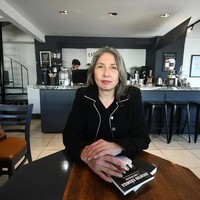
Shown in 2020 for El Debate.
Patricia Figueroa is a researcher, author, reporter, and political analyst from Culiacan, Sinaloa, Mexico. She graduated with a Masters’s degree in Economics and Social Science, then went on to achieve her Ph.D. in Social Science from the Autonomous University of Sinaloa. She began her career in the radio station Autonomous de Sinaloa and has worked in a commercial radio station as a broadcaster. Her latest work was in Televisa radio en Sinaloa for eight years while also working at a television cable called Megacable.
Dr. Figueroa suffered censorship on two occasions in her job. She was told that she had to focus on specific research and information during an interview with a governor, which caused her to change her journalism research. This research focused on narco-trafficking which gave her the opportunity to write books about this topic she is ultimately passionate about. One of her books is called “Ética en Tiempos de Guerra y Narcotráfico. Relación Policía-Periodista” which combined her academic research on the subject of narco-trafficking along with her experience as a journalist. She also wrote “Juventud Cósmica en Construcción. Sinaloa y la obra democrática del nuevo milenio” which is about a teen proud of her history in Sinoloa along with being open about sexual diversity, discrimination against indigenous people, and stigmas about drug trafficking and the violence. From 2013-2017, Dr. Figueroa was also a research scholar at the Institute of Latin America Studies at Columbia University with an Exchange Visitor Program. I had the luxury to sit down and interview Dr. Figueroa to ask her about her time as a journalist and what motivated her to earn a Ph.D.
“If your philosophy of life, Yesmil, is learning constantly, a Ph.D. gives you a sense of what you know empirically. It allows you to transform to scientific knowledge and that’s valuable.”
-Patricia Figueroa, 2021
She has gone through a few experiences of gender stereotypes in Sinaloa because it’s normalized in Mexico. She has experienced censorship at the beginning of her career 15 years ago. She was contacted for a news channel and almost wasn’t hired because “a man has more credibility than a woman,” along with being told that a man should be paid more. There was even an occasion where men in her job have called her doll in Spanish.
“…Mexico needs to fight for the issue of equality and gender in regards to jobs and regards to the respect the women that have to do their job and not have them be called a doll, to not be called beautiful… to show that you can and you’re prepared; that you’re a smart woman…”
– Patricia Figueroa, 2021
These occasions have hurt Dr. Figueroa, but she decided to aspire above men and used reverse psychology by calling them doll as well so he could understand the feeling of gender name-calling, and this colleague stopped. By Dr. Figueroa earning her Ph. D, she was given a sense of credibility that a man would never be able to question her.
Her parents’ support is what makes her remember to stay true to her intuition. She is the first in her family to gain a Ph.D. which her parents are very proud of. Dr. Figueroa’s role models are her parents and she believes she remains true to her beliefs because of them and that is never going to change her as a journalist.
“There’s something that I believe is going to give you, I always got it, a guide to make decisions which is the respect and love you have for your parents.”
– Patricia Figueroa, 2021
One thing that inspired me during this interview was the fact that Dr. Figueroa always stays true to her beliefs and showed that consistency in her answers. When I asked her if there was any advice she would give her younger self, she informed me about a time she had to interview a governor about narco-trafficking in Sinoloa with pre-made questions that were offensive and imposed censorship towards Dr. Figueroa. She declined the offer because she realized it was about selling her content and keeping a commission and that is not what Dr. Figueroa believes in as a journalist. To her, to sell information is to be a public relations agent, not a journalist. I noticed she wants to be able to break the stigma and have journalists stay true to their viewers along with themselves and that is something I aspire to be. Wanting to be in the film industry there are times where women experience censorship and that causes me to not want to be in this industry at all, but speaking to Dr. Figueroa made me realize that a woman can aspire above anything if you remain true to yourself.
Works Cited
Figueroa, Patricia. ” Author: Patricia Figueroa”. Noria Research, Feb 2015.
Figueroa, Patricia “Profile Link” Linkedin.
Prepared by Yesmil Cepeda


